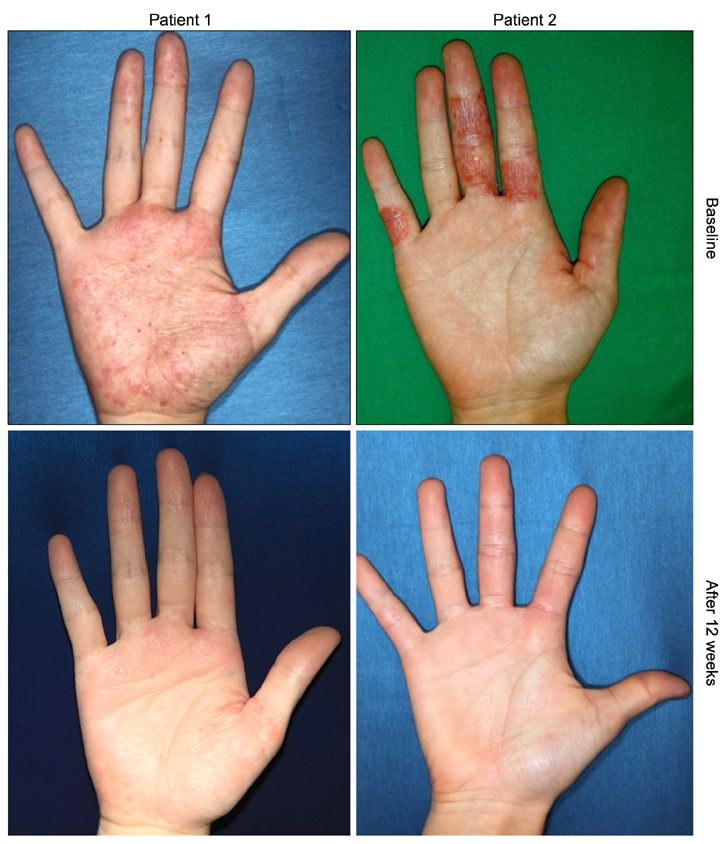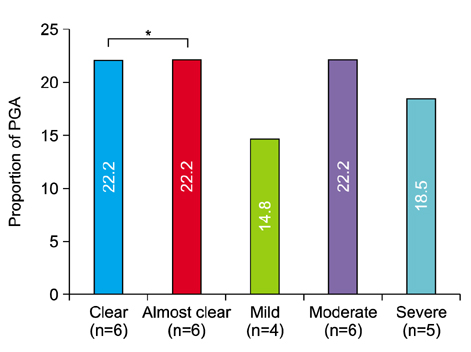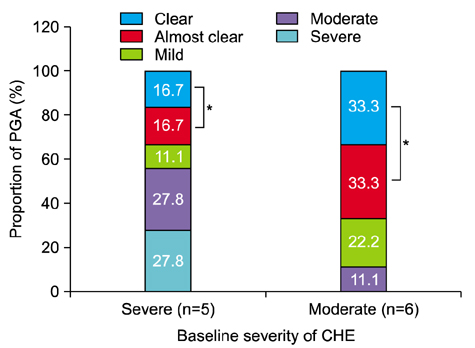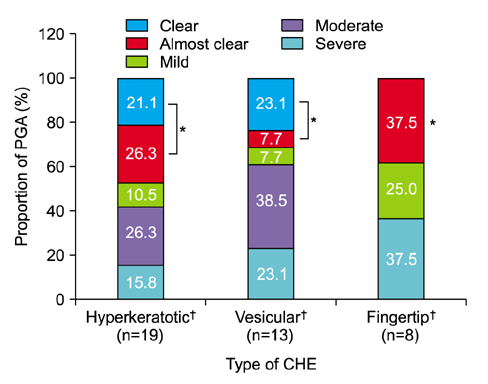Ann Dermatol.
2016 Jun;28(3):364-370. 10.5021/ad.2016.28.3.364.
Efficacy and Safety of Alitretinoin for Chronic Hand Eczema in Korean Patients
- Affiliations
-
- 1Department of Dermatology, Hanyang University College of Medicine, Seoul, Korea. romio@hanyang.ac.kr
- KMID: 2164645
- DOI: http://doi.org/10.5021/ad.2016.28.3.364
Abstract
- BACKGROUND
Chronic hand eczema (CHE) tends to be refractory to conventional therapy. Previous clinical trials have found that a 24-week treatment course of oral alitretinoin is effective and well tolerated for CHE treatment.
OBJECTIVE
The aim of this study was to investigate the efficacy and safety of oral alitretinoin in Korean CHE patients.
METHODS
A total of 27 patients with moderate to severe CHE took 30 mg of alitretinoin daily for 12 weeks. The primary efficacy parameter was the physician's global assessment (PGA). The response was defined as a patient being "clear" or "almost clear" of disease. The secondary efficacy parameters were the modified total lesion symptom score (mTLSS) and the patients' global assessment (PaGA). All adverse events and laboratory abnormalities were recorded during the treatment period.
RESULTS
Alitretinoin led to CHE symptom improvement in 44.4% of patients. The PGA, mTLSS, and PaGA scores correlated well with each other. Reported adverse events were typical retinoid class effects and headache was the most common.
CONCLUSION
Taking 30 mg of oral alitretinoin daily for 12 weeks was found to be effective in treating Korean patients with CHE, compared with the 24 week-treatment shown in previous studies.
Keyword
Figure
Cited by 2 articles
-
Efficacy and Safety of Oral Alitretinoin in Hand Eczema and Palmoplantar Pustulosis in Korean Patients
Ji Su Lee, Hyun-sun Park, Hyun-Sun Yoon, Soyun Cho
Ann Dermatol. 2019;31(2):139-145. doi: 10.5021/ad.2019.31.2.139.Efficacy and Safety of Alitretinoin Therapy in Korean Elderly Patients with Chronic Hand Eczema: A Retrospective Single Center Study
Mingyul Jo, Ho Song Kang, Min-Soo Kim, Hyang-Joon Park, Mihn-Sook Jue
Ann Dermatol. 2019;31(6):595-600. doi: 10.5021/ad.2019.31.6.595.
Reference
-
1. Diepgen TL, Agner T, Aberer W, Berth-Jones J, Cambazard F, Elsner P, et al. Management of chronic hand eczema. Contact Dermatitis. 2007; 57:203–210.
Article2. Diepgen TL, Pfarr E, Zimmermann T. Efficacy and tolerability of alitretinoin for chronic hand eczema under daily practice conditions: results of the TOCCATA open study comprising 680 patients. Acta Derm Venereol. 2012; 92:251–255.
Article3. Landow K. Hand dermatitis. The perennial scourge. Postgrad Med. 1998; 103:141–142. 145–148. 151–152.4. Ruzicka T, Larsen FG, Galewicz D, Horváth A, Coenraads PJ, Thestrup-Pedersen K, et al. Oral alitretinoin (9-cis-retinoic acid) therapy for chronic hand dermatitis in patients refractory to standard therapy: results of a randomized, double-blind, placebo-controlled, multicenter trial. Arch Dermatol. 2004; 140:1453–1459.5. Ruzicka T, Lynde CW, Jemec GB, Diepgen T, Berth-Jones J, Coenraads PJ, et al. Efficacy and safety of oral alitretinoin (9-cis retinoic acid) in patients with severe chronic hand eczema refractory to topical corticosteroids: results of a randomized, double-blind, placebo-controlled, multicentre trial. Br J Dermatol. 2008; 158:808–817.
Article6. Yu M, Han TY, Lee JH, Son SJ. The quality of life and depressive mood among Korean patients with hand eczema. Ann Dermatol. 2012; 24:430–437.
Article7. Bissonnette R, Diepgen TL, Elsner P, English J, Graham-Brown R, Homey B, et al. Redefining treatment options in chronic hand eczema (CHE). J Eur Acad Dermatol Venereol. 2010; 24:Suppl 3. 1–20.
Article8. Bollag W, Ott F. Successful treatment of chronic hand eczema with oral 9-cis-retinoic acid. Dermatology. 1999; 199:308–312.
Article9. Dirschka T, Reich K, Bissonnette R, Maares J, Brown T, Diepgen TL. An open-label study assessing the safety and efficacy of alitretinoin in patients with severe chronic hand eczema unresponsive to topical corticosteroids. Clin Exp Dermatol. 2011; 36:149–154.
Article10. Diepgen TL, Elsner P, Schliemann S, Fartasch M, Köllner A, Skudlik C, et al. Deutsche Dermatologische Gesellschaft. Guideline on the management of hand eczema ICD-10 Code: L20. L23. L24. L25. L30. J Dtsch Dermatol Ges. 2009; 7:Suppl 3. S1–S16.
Article11. English J, Aldridge R, Gawkrodger DJ, Kownacki S, Statham B, White JM, et al. Consensus statement on the management of chronic hand eczema. Clin Exp Dermatol. 2009; 34:761–769.
Article12. Agner T, Andersen KE, Brandao FM, Bruynzeel DP, Bruze M, Frosch P, et al. EECDRG. Hand eczema severity and quality of life: a cross-sectional, multicentre study of hand eczema patients. Contact Dermatitis. 2008; 59:43–47.
Article13. Menné T, Johansen JD, Sommerlund M, Veien NK. Danish Contact Dermatitis Group. Hand eczema guidelines based on the Danish guidelines for the diagnosis and treatment of hand eczema. Contact Dermatitis. 2011; 65:3–12.
Article14. Meding B. Epidemiology of hand eczema in an industrial city. Acta Derm Venereol Suppl (Stockh). 1990; 153:1–43.15. Halpern SM, Anstey AV, Dawe RS, Diffey BL, Farr PM, Ferguson J, et al. Guidelines for topical PUVA: a report of a workshop of the British photodermatology group. Br J Dermatol. 2000; 142:22–31.
Article16. Thestrup-Pedersen K, Andersen KE, Menné T, Veien NK. Treatment of hyperkeratotic dermatitis of the palms (eczema keratoticum) with oral acitretin. A single-blind placebo-controlled study. Acta Derm Venereol. 2001; 81:353–355.
Article17. Granlund H, Erkko P, Eriksson E, Reitamo S. Comparison of cyclosporine and topical betamethasone-17,21-dipropionate in the treatment of severe chronic hand eczema. Acta Derm Venereol. 1996; 76:371–376.18. Berth-Jones J, Takwale A, Tan E, Barclay G, Agarwal S, Ahmed I, et al. Azathioprine in severe adult atopic dermatitis: a double-blind, placebo-controlled, crossover trial. Br J Dermatol. 2002; 147:324–330.
Article19. Diepgen TL, Sauerbrei W, Fartasch M. Development and validation of diagnostic scores for atopic dermatitis incorporating criteria of data quality and practical usefulness. J Clin Epidemiol. 1996; 49:1031–1038.
Article20. Bissonnette R, Worm M, Gerlach B, Guenther L, Cambazard F, Ruzicka T, et al. Successful retreatment with alitretinoin in patients with relapsed chronic hand eczema. Br J Dermatol. 2010; 162:420–426.
Article
- Full Text Links
- Actions
-
Cited
- CITED
-
- Close
- Share
- Similar articles
-
- Efficacy and Safety of Oral Alitretinoin in Various Refractory Dermatologic Diseases: A Retrospective Study
- Efficacy and Safety of Oral Alitretinoin in Hand Eczema and Palmoplantar Pustulosis in Korean Patients
- Efficacy and Safety of Alitretinoin Therapy in Korean Elderly Patients with Chronic Hand Eczema: A Retrospective Single Center Study
- Alitretinoin Compliance in Patients with Chronic Hand Eczema
- Effect of Oral Alitretinoin Therapy on Trachyonychia






